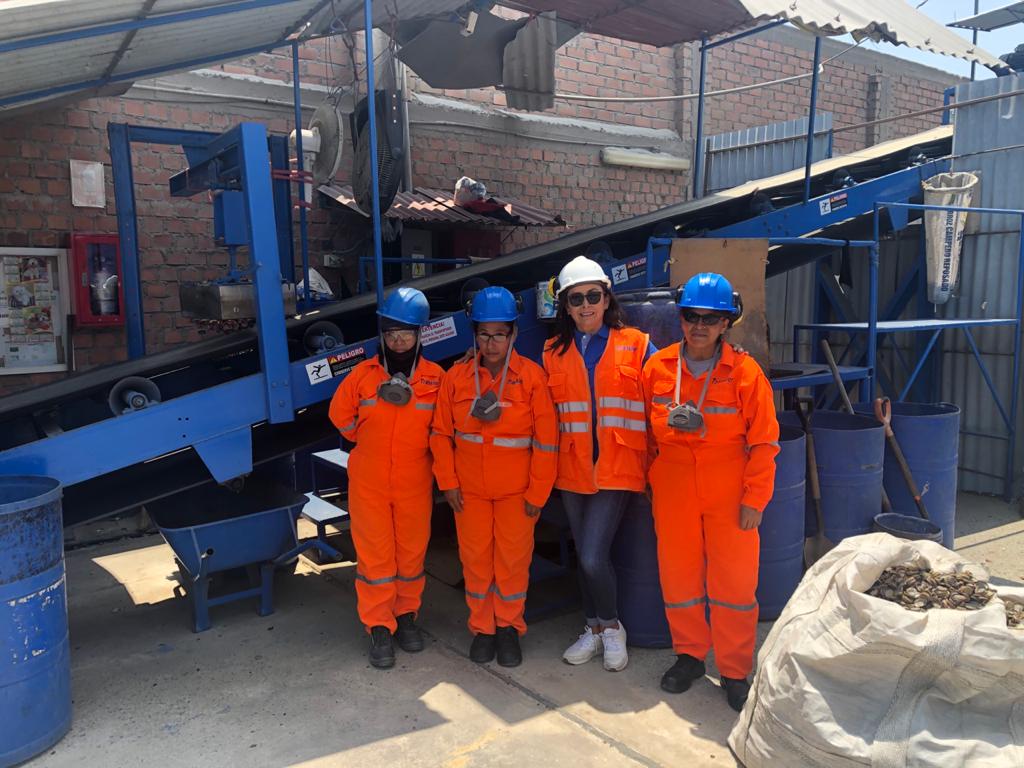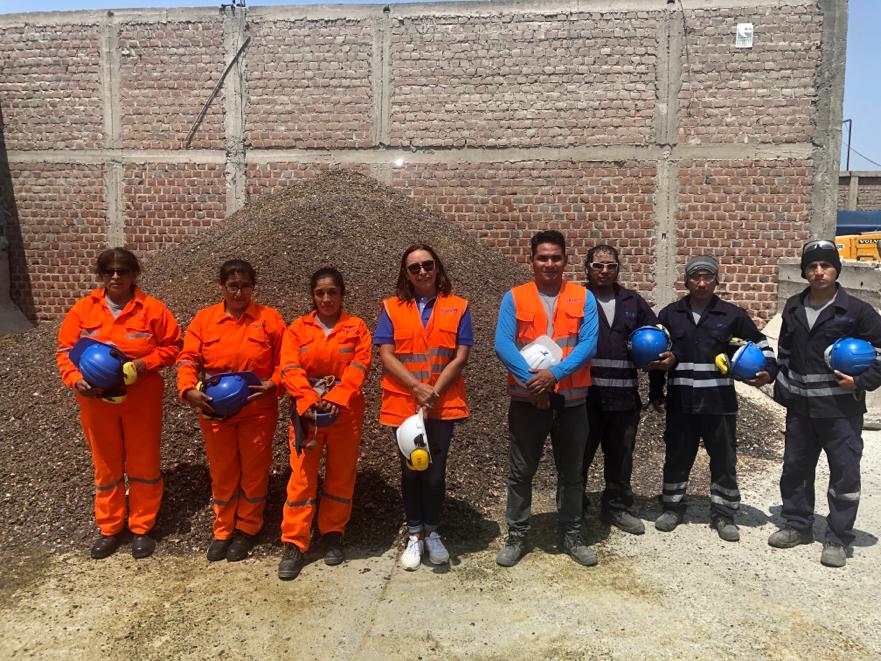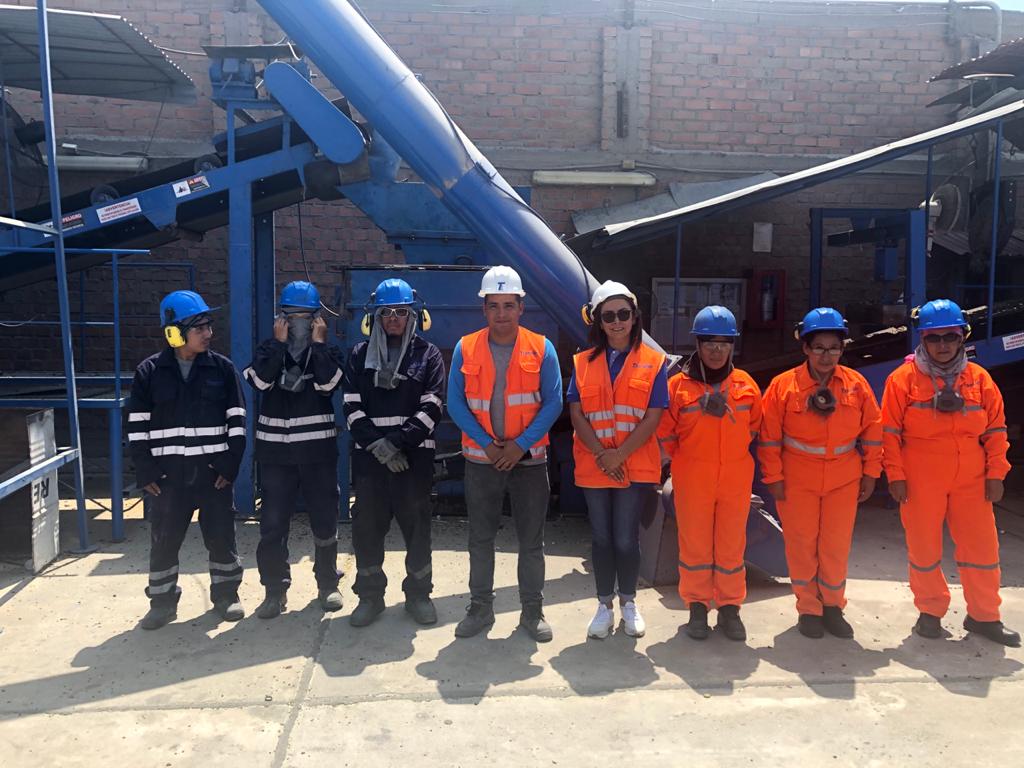To celebrate International Women's Day on the 8th of March, the Economic Empowerment of Women in Green Industry (EEWiGI) held an interview with Patricia Valdez, who has contributed to the formalization of the glass-recycling sector in Peru.
Patricia Valdez participated in a national assessment of Peru’s green industry as part of the UNIDO programme “Economic Empowerment of Women in Green Industry”, which is making a significant push to improve leadership and participation of women as entrepreneurs and industry professionals, while also advancing green industrialization. The programme, underway in Cambodia, Peru, Senegal and South Africa, is assisting policymakers and practitioners with the establishment and implementation of a policy framework to integrate gender and green industrial policies.

Who has influenced your career? Who has supported you?
As a lawyer specialized in customs matters, I am in charge of the legal section of my family’s businesses. One of these businesses, which is also my favourite one because of its positive environmental impact, is glass recycling.
I had a relatively privileged childhood. My four sisters and I were raised in Cusco, a wonderful Peruvian city situated in the Andes and surrounded by areas dedicated to agriculture, handicraft and industry. I grew up loving and respecting nature.
It is fair to say that my dad also played a very special role in this, by transmitting the traditional values, customs and knowledge of the indigenous Peruvian groups.
My mother was also very influential in the development of my professional life. When she was growing up, it was not very common for women to develop a career other than being a schoolteacher. She was an excellent mother of five girls; she studied at the university, and became an accountant and an economist. She was an economically independent person, capable of maintaining her home in all circumstances. She was an example of an empowered woman, struggling against prejudices in a world led by men where it was rare to see a woman in a management position.
Today I have my own family with two children. Although my husband leads our family businesses (Ed: freight transport, machinery rental and the recycling plant), we all are involved. My youngest daughter studies environmental engineering and she is a brave young woman totally committed to the protection of the environment. My oldest son is more traditional, so to speak. He studies business administration but he is also sensitive to the environment. I feel happy that both of them are on their way to taking the leadership of the family business.
What specific industry you are working in?
I work in the glass-recycling sector. I started thanks to my husband, who 25 years ago encouraged me to start the recycling plant project together with him. You will ask me, how did this project come about? It was a business opportunity, which gradually became a source of many satisfactions, and a way to address existing environmental and social issues.
It all started with the transport company we own. At the time, we noticed that one of our most important clients, a glass bottle and container manufacturer, had difficulties acquiring glass for its activities, due to the informality of the recycling sector. Twenty-five years ago, there were almost no established recyclers, and working conditions in the informal sector were very hard, with exposure to diseases and abuses, with little to no labour rights, and extremely low wages. It was one of the most informal sectors in our country.
There was a mix of factors, which encouraged us to jump into this activity: we saw a business opportunity and, with my experience as a tax lawyer, I was not afraid and I knew how to help the recyclers in formalizing their activities.
That is how we decided to become a glass supplier, for which we began a long and strenuous work with glass recyclers and collectors, who had no legal status and no company to work with. This is how we started the process to support the recyclers to formalize their labour conditions.
Over the years, we began the construction of a recycling plant, where the process of selecting glass by colours is carried out, the washing and removal of impurities, and finally the crushing or grinding of the glass. We work in the whole value chain, transporting it to the glass factories where it goes directly to the ovens.
Obviously, the road to get here was long and winding, but fortunately, today our hard work has led us to be the main glass-processing company in the country.
 What barriers have you faced as a woman working in green industry?
What barriers have you faced as a woman working in green industry?
Fortunately, I have not faced barriers caused by my status as a woman, other than those experienced by any person in the country. I think this is mainly due to the support I received from my husband and my family, and because I come from a background where women have always worked - this is something natural.
What I should underline is that, in Peru, as in many countries, childcare is mainly carried out by mothers. It is a second full-time job. It is therefore very difficult to be a working mother. I find this double role that almost all women in the world have is very hard and more priority should be given to improve care systems for working mothers.
What opportunities do you see for other women?
As for the opportunities that the glass recycling business offers to women in general, it is important to mention that, at the beginning of our activity, more than 25 years ago, there were not many women glass-recyclers. Most were men. However, it should be pointed out that the participation of the recyclers’ wives was very important: they supported their husbands in the collection process and thus contributed towards producing a better product to sell, and thereby generated a greater income for the family. In fact, it was a "family" business, with an intensive female labour but the work of the woman was not visible. This has been changing.
It is important to note that, nowadays, a significant number of women are working in our processing plant. They are in charge of the process of removing impurities from the washed glass before the crushing process. This is because we noticed that women are often more careful than men in this part of the process.
The evidence shows that there is an important space for women in this sector, especially for those who do not have a higher education, since this is an activity that basically requires common sense and attention to detail. Working in a formal company like ours provides them with not only an income but also access to social security benefits for themselves and their families.
What is your vision for the future of green industry in your country?
There is still much to do. For example, the policy framework which encourages such activities could be further strengthened as we can protect the environment and reduce poverty.
In fact, from our experience, we have faced difficult moments, especially with the issue of formalization since glass collecting and recycling are activities that is typically carried out in the streets. “Formalization” in the traditional sense of the term is difficult. Furthermore, the fiscal administration does not take into account these peculiarities, generating tax contingencies for the company and the recyclers. Therefore, a review of the sector is urgently needed to promote a more supportive policy framework that acknowledges the working conditions of this sector and improves the conditions for its workers.
What would you advise women and girls who want to follow your steps and be part of this industry?
I would recommend women and especially girls to study more and longer, as education is the best tool for them to be economically independent in their adult life. For those specifically in the recycling sector, I can recommend that they never stop learning; there is always something new to understand.
Another recommendation is to persevere in everything, to follow your dreams, and to not stop before you accomplish them. Things do not always go well when we start something new and often failure is the best way to learn and improve.
During your professional life, you must have gone through several situations that are worth remembering. Do you have any anecdotes that you would like to share with the women and girls who are reading this publication?
Save many anecdotes and hard moments I could talk about. Once, one of the operators, who was not following the established protocol, fell into the mill…. You can imagine the consequences. It was a very hard time, but here we are. This worker is still working with us, but in other activities.
Being an entrepreneur is like a roller coaster of emotions. Sometimes you are very happy, satisfied with what you are achieving, and, at another moment, you feel that you are about to throw in the towel but, at the end of the day, the balance is really positive, even more if the business in which you are has a positive impact on the environment, society and the lives of people you work with.
 What should policymakers do to make things easier for women to join in with green industry?
What should policymakers do to make things easier for women to join in with green industry?
There is so much to do...
It is essential to have a competent, qualified and motivated workforce to improve the participation of women in the labour/business field.
In many economic sectors, where great opportunities open up, it is necessary to increase the quality of work by improving working conditions (health and safety at work). This is the case for agriculture, waste management and the recycling and textile sectors, where for different reasons there are a large number of working women in Peru.
For example, in recycling, the majority of the recyclers have informal jobs and the majority are women. Recycling can only become a truly sustainable activity if this occupation is formalized. In other countries like Brazil, Colombia and Sri Lanka, recyclers are organized in cooperatives and companies, making it clear that formalization can offer great opportunities.
Special attention should be given to small and medium-sized enterprises (SMEs) during the process of transition to green industries, where there are already many women. In Peru, SMEs represent more than two-thirds of employment and generate the majority of jobs, but they are also large polluters and consumers of resources. They are generally at a disadvantage compared to big companies in relation to access to market information, skills development programmes, new technologies and green finance. Policies that facilitate the transition of SMEs towards a greener economy and allow them to take advantage of the opportunities available will be fundamental.
Traditional public education and training, intensive business courses, knowledge and technology centres, business training and development programs for women are also other interesting areas to take into consideration.
--------------------
An increasing number of women are becoming more visible in the recycling and waste management sectors. Whilst many work informally, more women are slowly choosing to build their careers in this sector. The visibility of women’s work in this industry needs to increase to better understand the different skills women bring and how their needs differ from men. The evidence-based gender mainstreaming of green industry policies is therefore essential if we want to truly reduce the barriers women are facing in the industry at all levels and recognize the important role they play and will continue playing in this growing sector. Gender-responsive green industry policies that consider everyone’s needs will benefit everyone.

